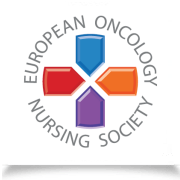
2 October 2019
Once again, the European Oncology Nursing Society (EONS) joined the European Society for Medical Oncology (ESMO) at their annual conference. This year the conference was based in the impressively sized ‘Fira’ Exhibition centre in Barcelona and was the 12th EONS conference to be held.
In general terms both conferences are well worth attending, ESMO is one of the largest medical conferences in Europe with an attendance of around 25,000 oncology professionals, largely made of oncology doctors. EONS is much more modest being attended by around 200 oncology nurses from a range of European countries.
Despite the differences in size the EONS conference sits well in with its larger brother. In Barcelona, the facilities were excellent with a dedicated conference hall and breakout room and an EONS lounge for the sole use of EONS members (to which UKONS is affiliated) between presentations. EONS12 was held over three days and consisted of sets of presentations each one being around 15-20 minutes in duration. With ample opportunity for questions from the floor to the presenters who formed a panel following each set of presentations. The themes this year included Patient Safety, Living with and Beyond Cancer, Trends in Palliative Care, Cancer Nursing Workforce Issues and Patient and Public Involvement. In addition to these, there were industry sponsored symposia and an additional collaborative joint session from the EONS Young Cancer Nurses and ESMO Young Oncologists Committee.
The EONS Young Cancer Nurses survey has concluded. The survey asked the opinion of nearly 400 nurses and found that many were struggling with poor working conditions and lack of support. Despite this most felt highly motivated, but those who felt less well motivated identified lack of recognition for the work they did and poor working conditions as the biggest factors behind this. Young cancer nurses wanted EONS to provide more education and advocacy as a representative organisation. The conference also raised the possibility of continued joint working between young cancer nurses and the young oncologists committee.
Constantina Papadopoulou, a Lecturer in Cancer Care from the University of the West of Scotland gave an excellent presentation on training nurses to discuss sexuality and sexual health. This promoted much discussion in the hall, and afterwards. It seems likely that this topic may need further coverage in the near future when back in the UK.
Being such a ‘hot topic’ and an important challenge facing cancer nursing (and indeed nursing as a whole) the session on workforce was eagerly awaited. This turned out to feature a strong line-up of nurses from across Europe forming a consensus that the broad working environment was a major factor in recruiting and retaining passionate and well-motivated nurses. The crucial issue is how best to address this over all of Europe?
Finally, a strong theme from this year’s EONS Conference was the further development of Patient Reported Outcome Measures (PROMS). Partially this has been driven by a recognition in medicine that clinical trials chronically under-report adverse events or poor outcomes as patients may not asked the ‘right’ questions. Nurses have been using this type of research for many years but are now fine tuning these by using portable technology for patients to utilise.
There were many other presentations and themes from EONS12, but we do not have the space to highlight these here.